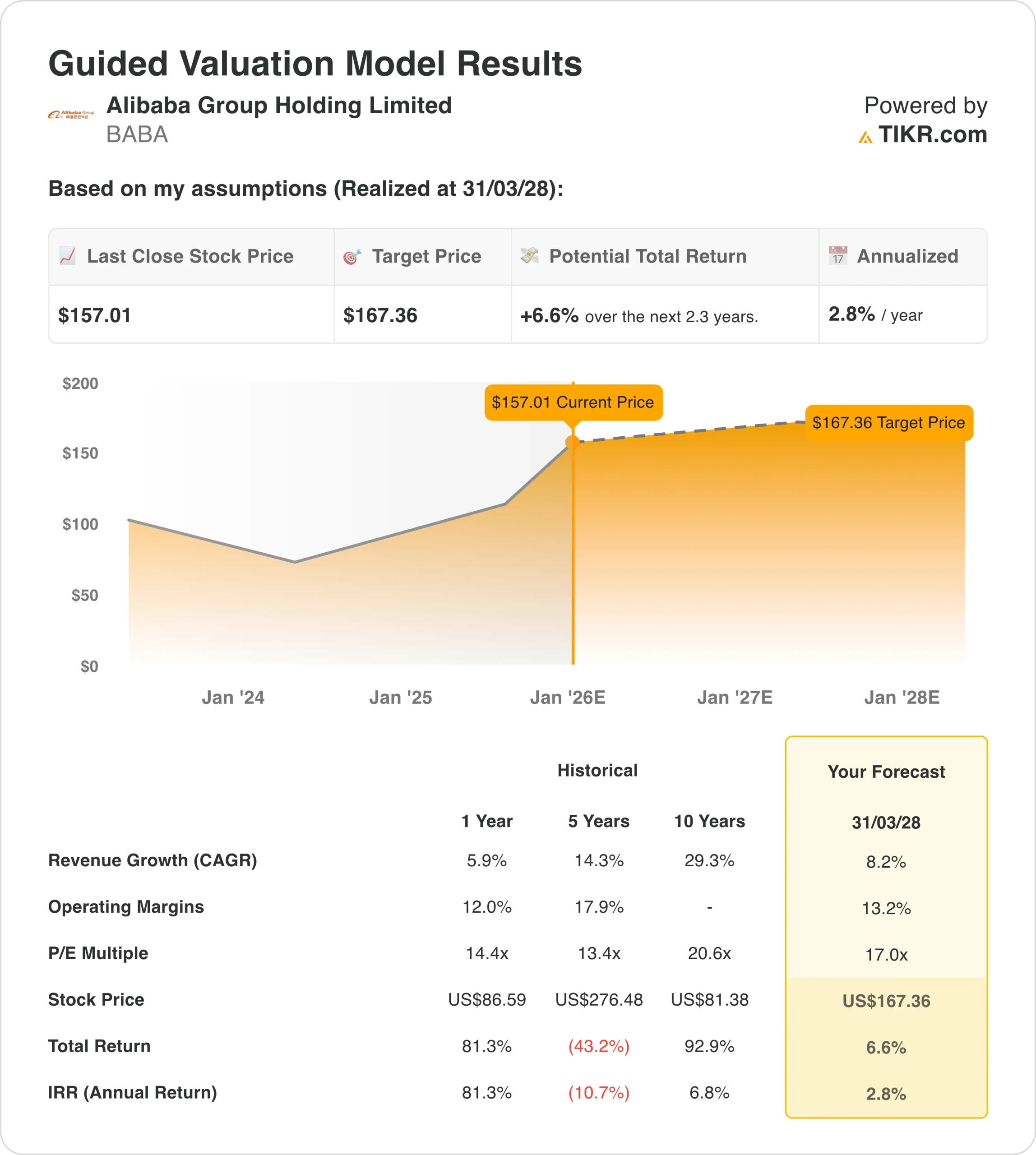Key Stats for Alibaba Stock
- Price Change for Alibaba stock: -2.3%
- $BABA Share Price as of Nov. 25: $157
- 52-Week High: $193
- $BABA Stock Price Target: $197
Now Live: Discover how much upside your favorite stocks could have using TIKR’s new Valuation Model (It’s free)>>>
What Happened?
Alibaba (BABA) stock fell over 2% on Tuesday after the Chinese tech giant reported accelerating growth in its cloud computing business, even as overall profitability took a major hit.
The company’s cloud division, which houses its AI-related revenue, grew 34% year-over-year to RMB 39.8 billion, beating analyst expectations and marking a significant acceleration from the 26% growth posted last quarter.
CEO Eddie Wu made headlines by suggesting the company could dramatically increase its AI spending beyond the already massive RMB 380 billion ($53 billion) investment plan announced earlier this year.
During the earnings call, Wu revealed that Alibaba is struggling to keep up with customer demand for AI infrastructure.
“We are not even able to keep pace with the growth in customer demand in terms of the pace at which we can deploy new servers,” Wu explained.
He added that the initial RMB 380 billion target “might be on the small side” and that Alibaba “wouldn’t rule out further scaling up that capex investment.”
The company has already spent around RMB 120 billion on AI and cloud infrastructure over the past four quarters. But with AI-related product revenue posting triple-digit growth for the ninth consecutive quarter, management clearly sees room to invest even more aggressively.

Beyond cloud computing, Alibaba stock got a boost from strong momentum in its quick commerce business.
Revenue from the instant delivery segment surged 60% year over year, compared with just 12% growth in the prior quarter.
Jiang Fan, who runs Alibaba’s e-commerce operations, called quick commerce a “strategic pillar” and set an ambitious goal of reaching RMB 1 trillion in gross merchandise value within three years.
See analysts’ growth forecasts and price targets for Alibaba stock (It’s free!) >>>
What the Market Is Telling Us About BABA Stock
Investors are clearly willing to look past Alibaba’s near-term profitability challenges in favor of its long-term growth prospects.
Adjusted EBITA plunged 78% year-over-year to just RMB 9.1 billion, primarily due to heavy investments in quick commerce and AI infrastructure.
Despite this massive profit decline, Alibaba stock rallied on the strength of its cloud acceleration and e-commerce momentum.
The market’s enthusiasm reflects growing confidence that Alibaba can compete effectively in China’s booming AI sector.
The company recently launched its Qwen app, a ChatGPT rival powered by Alibaba’s own AI models, which surpassed 10 million downloads in its first week.
This early traction validates Alibaba’s consumer AI strategy and suggests the company has a credible path to monetizing its massive AI investments.
Wu also pushed back strongly against concerns about an AI bubble, arguing that supply constraints will keep demand elevated for at least the next three years.
He noted that GPUs from Nvidia and other manufacturers are running at full capacity, including older models that are three to five years old.
Supply chain bottlenecks across memory chips, storage, and semiconductor manufacturing further support his view that AI infrastructure will remain undersupplied relative to demand.
“I think in the next three years to come, AI resources will continue to be undersupplied with demand outstripping supply,” Wu said. “We don’t really see much of an issue in terms of a so-called AI bubble.”

The quick commerce investments appear to be paying off strategically, even if they’re weighing on short-term profits.
The business is driving rapid growth in monthly active users on Alibaba’s Taobao app, which should support long-term monetization.
CFO Toby Xu suggested that the September quarter likely represents the peak investment period, with unit economics already improving significantly. The company has cut per-order losses by 50% since July and August while maintaining market share.
Alibaba stock faces legitimate concerns around competition, regulatory pressures in China, and the sustainability of its aggressive spending plans.
However, investors are betting that the company’s scale advantages and full-stack AI capabilities will position it to win in both enterprise cloud and consumer AI markets over the long term.
Estimate a company’s fair value instantly (Free with TIKR) >>>
How Much Upside Does Alibaba Stock Have From Here?
With TIKR’s new Valuation Model tool, you can estimate a stock’s potential share price in under a minute.
All it takes is three simple inputs:
- Revenue Growth
- Operating Margins
- Exit P/E Multiple
If you’re not sure what to enter, TIKR automatically fills in each input using analysts’ consensus estimates, giving you a quick, reliable starting point.
From there, TIKR calculates the potential share price and total returns under Bull, Base, and Bear scenarios so you can quickly see whether a stock looks undervalued or overvalued.
See a stock’s true value in under 60 seconds (Free with TIKR) >>>
Looking for New Opportunities?
- See what stocks billionaire investors are buying so you can follow the smart money.
- Analyze stocks in as little as 5 minutes with TIKR’s all-in-one, easy-to-use platform.
- The more rocks you overturn… the more opportunities you’ll uncover. Search 100K+ global stocks, global top investor holdings, and more with TIKR.
Disclaimer:
Please note that the articles on TIKR are not intended to serve as investment or financial advice from TIKR or our content team, nor are they recommendations to buy or sell any stocks. We create our content based on TIKR Terminal’s investment data and analysts’ estimates. Our analysis might not include recent company news or important updates. TIKR has no position in any stocks mentioned. Thank you for reading, and happy investing!







